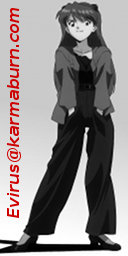26 March 2016: In re the End of Boku dake ga Inai Machi ~ERASED/My Purest Heart for Airi~
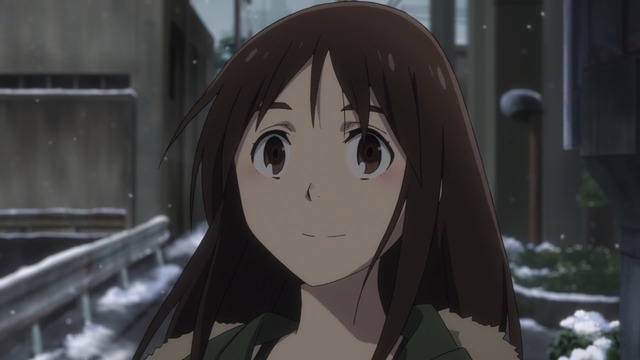
Surprise, everyone.
If you've been paying attention to the winter 2016 anime season at all, you probably noticed Boku dake ga Inai Machi (officially localized as ERASED, but sometimes colloquially Bokumachi) was a heavy favorite early on to be the season's best show. Personally, I had a few problems with the series preventing me from rating it quite so high, and a significant number of fans also grew dissatisfied with the show's second half, but ERASED is still regarded as one of this winter's best anime, despite some issues with the ending.
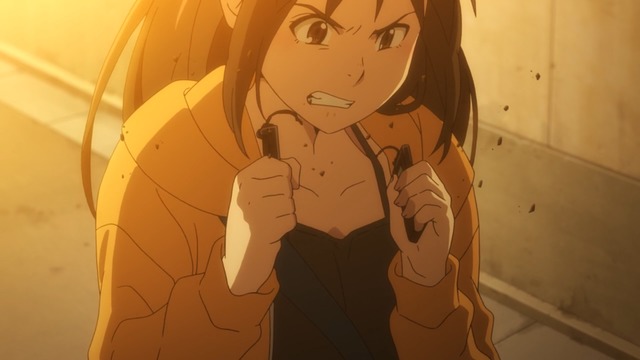
Airi sure hates phones.
I'm not here to discuss any of that. In fact, I'm not even here to talk about the main issues relating to the show's ending or how it differed from the manga's ending. Instead, this here blog entry is about Airi. Naturally, spoiler warnings still apply. While I'm not going to address the real "meat" of the show, meaning the killer or his motives or the fates of his victims, I am going to provide enough detail for the show's final episode that an astute reader should be able to assemble major plot developments from context alone.
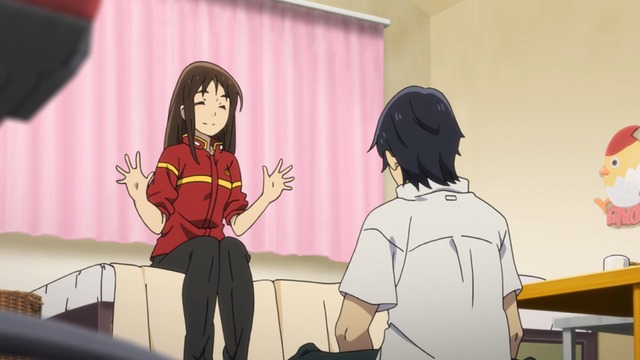
I wonder if 21-year-old Airi is still obsessed with that chicken thing.
O. Henry (the pen name of American author William Sydney Porter) wrote of a man dogged by fate in "Roads of Destiny," a short story found in the eponymous collection. In it, a poet reaches the same destination in his life despite the seemingly disparate alternate histories he creates via his choices at a crossroads. Similarly, Satoru discovers during the course of ERASED that it is not sufficient to interrupt one causal chain; he needs to attack the root of the problem if he is to have any hope of changing a person's destiny.
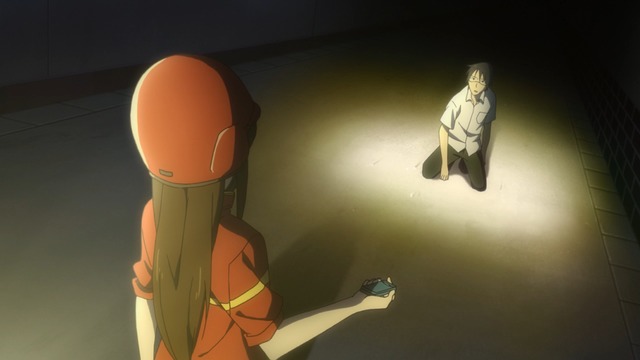
Damn it, guy, what did I just tell you about Airi and phones?
To the relief of some "'shippers" and the disgust of many other viewers, the very end of the Bokumachi anime concludes with the sudden appearance of a now-21-year-old Airi sheltering from the snowfall under a bridge along with a stunned thirtysomething Satoru. I posit her appearance here and the implication Airi and Satoru are "destined" for each other are due to the same forces leading David Mignot to his fate in "Roads of Destiny."
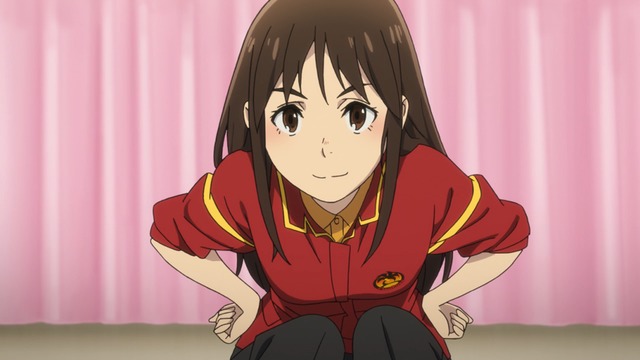
Airi brags that her anime bed isn't made of concrete.
Specifically, none of the things Satoru did in 1988 in order to change the future was designed to change Airi's life or his own, insofar as it relates to her. (And yes, this theory also means that little kid crossing the street almost certainly got smeared by the runaway truck because Satoru wasn't there this time to divert it. Sorry, kid.) So yes, of course Satoru and Airi were going to end up together. It's fate, see.
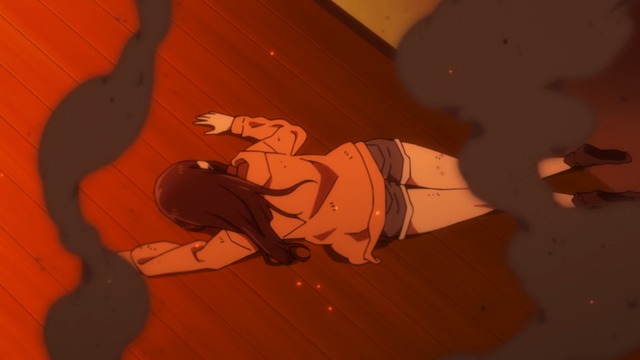
I guess they don't teach fire safety in Heisei Japan.
Unfortunately, the real reason Airi shows up at the end of Boku dake ga Inai Machi is because the original author of the manga (and the staff adapting the anime's truncated ending) wanted Airi and Satoru to end up together. It's difficult to view her arrival as anything other than a fortuitous narrative "reward" to Satoru for being as good as he's been to this world. Not that I have anything against stories that use female characters as trophies for male protagonists (if you happen to get offended by this sort of thing, go watch the ending of Gate to really give yourself something to cry about), rather the issue I have is this continuity's Airi has never met Satoru and would only know him as Coma Boy if she's heard of him at all.

Majin Milk Chocolate, delicious enough to steal, but not good enough to buy.
Satoru knows her, of course, providing the main details of her life are unchanged in this timeline. But what is he to do with this knowledge? Are we to believe they have such natural chemistry together that they'll hit it off from this chance encounter under the bridge? Am I inferring too much from the scene where no romantic opportunity is actually implied? Making her a complete stranger does complicate any future they may have together and is probably what I find most unsatisfying about her appearance. True, Airi has a larger role in the manga's conclusion, but the manga's ending has its own problems.
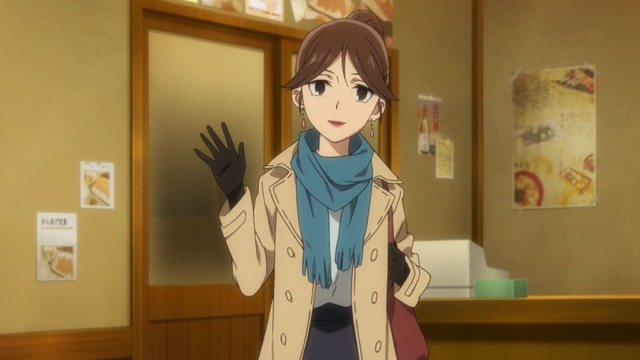
(1) We don't know thirtysomething Misato is necessarily single.
(2) She lives in Hokkaido. (3) She's [gasp] thirtysomething.
There's also the matter of their age difference. I can't actually think of any compelling reason why Airi's character had to be so young from a narrative standpoint. I'm going to leave this alone though, and pretend her youth is critical to support the mid-series revelation that she doesn't live with her mother.
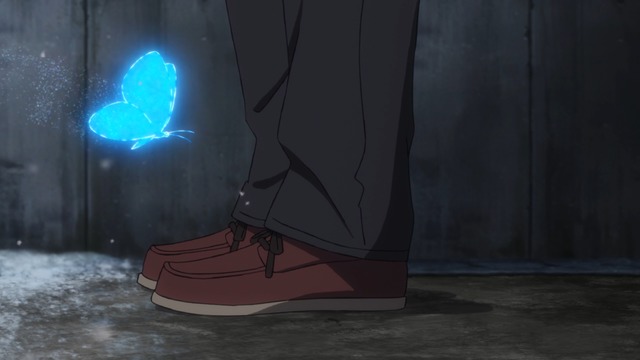
Boat shoes aren't actually a great choice for snowy & icy conditions.
Incidentally, I'm not sure what the butterfly at the end of ERASED is supposed to signify. Previously, it has always signaled an imminent "revival" rewind event before Satoru goes back to earlier in his life. I hope I'm not supposed to believe Satoru is about to leap back in time once more so he can slap the chocolate out of Airi's dad's hands. That will be especially difficult to do if he rewinds to a point where he's still in a coma. I suppose the butterfly actually indicates that this is a moment to Do Something for the Future. Hell, if that's it, I guess the butterfly had best stick around indefinitely then.


